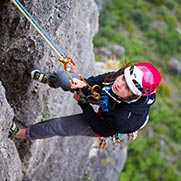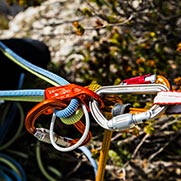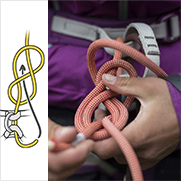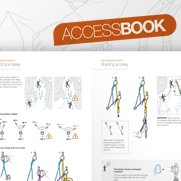Other progression situations that are incompatible with the RAD LINE hyperstatic cord.
Any progression situation that uses anchors with the RAD LINE presents a danger to the user in case of a fall.
Warnings
- Carefully read the Instructions for Use used in this technical advice before consulting the advice itself. You must have already read and understood the information in the Instructions for Use to be able to understand this supplementary information.
- Mastering these techniques requires specific training. Work with a professional to confirm your ability to perform these techniques safely and independently before attempting them unsupervised.
- We provide examples of techniques related to your activity. There may be others that we do not describe here.
Simultaneous progression with intermediate anchors.
If the leader or the second falls, there is a risk of excessive impact force.
Simultaneous progression on an arête.
In case of a fall, the arête or rock horns below the arête will function as anchor(s). Risk of excessive impact force.
Lead climbing in steep terrain, belayer at a belay station.
If the leader falls, there is a risk of excessive impact force.
Crossing a snow bridge with a direct belay off an improvised anchor (deadman).
If the snow bridge collapses, there is a risk of high impact force and/or anchor pull-out.
Crossing a snow bridge with an indirect belay off a person, tethered to an improvised anchor (deadman)
The rope must be kept perfectly taut to limit the fall distance if the snow bridge collapses. Belay with a "body belay" or with a Munter hitch on the belayer's harness.
If the snow bridge collapses, the impact force on the belayer can be high. The belayer must therefore be extremely vigilant and securely braced.
Short roping
The goal of this technique is not to arrest a fall, but to minimize the chance of a fall through the constant vigilance of the leader.
There is thus no limitation with the RAD LINE cord, provided that the belay method doesn't change along the way, for example by using anchor points to cross a steep section.
Note: most of the tests done with this technique demonstrated a high probability of a group fall regardless of the rope used. This technique is reserved for use by experienced and knowledgeable leaders.









